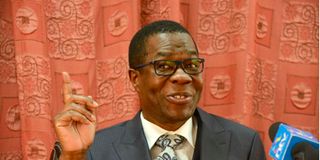MPs toughen rules for submitting supplementary budgets

Ugunja MP Opiyo Wandayi, chair of the National Assembly Public Accounts Committee, addresses the media at Parliament buildings on October 24, 2018.
What you need to know:
- Gatanga MP Joseph Ngugi, a member of the Public Accounts Committee (PAC), decried blatant abuse of the spirit of the supplementary budget.
Supplementary budgets will no longer be submitted to Parliament within two months to the end of a financial year.
This is because MPs have adopted a report of the Public Accounts Committee (PAC) after the House approved the report of the Budget and Appropriations Committee (BAC) on the supplementary budget II for the 2020/21 financial year, banning submission of mini budgets beyond April 30.
PAC, a watchdog committee of the National Assembly, notes in its report on the accounts of the national government for the 2017/18 financial year that mini budgets submitted to the House during the period usually have unnecessary expenditures.
The committee chaired by Ugunja MP Opiyo Wandayi further notes that mini budgets have led to underutilisation of the approved budget by approximately 8.5 percent for the last five years.
“The Cabinet Secretary, National Treasury, should ensure that no supplementary budget estimates are submitted to Parliament later than two months before the close of the financial year,” the committee says in the report adopted by the House.
The government’s financial year starts on July 1 and ends on June 30.
This means that no mini budgets shall be presented to the National Assembly after April 30 every financial year.
Amendment of law
To actualise this, Mr Wandayi told Nation that the committee has sponsored a Bill to amend section 44 of the Public Finance Management (PFM) Act of 2012, that he will introduce in the House next week.
The section reads that the national government shall submit to Parliament, for approval, a supplementary budget in line with Article 223 of the constitution.
“We have a Bill ready to implement our recommendations in regard to the presentation of supplementary budgets to the House. The Bill ensures the spirit of supplementary budgets is not abused by those who want to pilfer public resources,” Mr Wandayi noted.
Article 223 of the Constitution provides that the national government may spend money that has not been appropriated.
This is, however, if the amount appropriated by the National Assembly is insufficient or if a need has arisen for which no amount has been appropriated.
Limited scrutiny
The BAC report notes that submission of supplementary budgets too close to the end of the financial year limits the oversight role of the National Assembly due to the tight timelines for scrutiny of the budget.
“To allow adequate time for scrutiny, no supplementary budget should be submitted to Parliament after April 30 in any financial year,” the adopted BAC report recommends.
The PAC report further notes that in the 2017/18 financial year, only 90 percent of the approved gross estimated expenditure was spent, leaving Sh270.95 billion underutilised.
This is after the National Assembly approved additional funds in second supplementary estimates for the financial year in late June 2018, for government ministries, departments and agencies (MDAs).
The MDAs had, however, not used the funds by the close of the financial year on June 30, 2018.
During the 2019/20 financial year, the National Treasury submitted to the House a supplementary budget estimate seven days before the end of the financial year.
“The low utilisation of the approved budget is attributable to the late approval of supplementary budget estimates by the National Assembly,” the PAC report reads.
Regulations flouted
Gatanga MP Joseph Ngugi decried blatant abuse of the spirit of the supplementary budget.
“These supplementary budgets are always laden with new projects, contrary to PFM regulations,” said Mr Ngugi, a member of PAC.
PFM regulation 40 (8) states that no new programmes are to be introduced in supplementary budgets.
“Despite the provisions of the law, this behavior of introducing new projects in mini budgets has been recurring. The National Assembly has raised concerns several times over previous supplementary budgets but nothing seems to be happening,” added Mr Ngugi.
“The regulations continue to be flouted, raising serious concerns on the National Treasury’s commitment to PFM discipline.”
The budget committee further wants the National Treasury to develop a framework for engaging MDAs, including Parliament and the Judiciary, so as to have an inclusive process during the preparation of supplementary estimates.
The framework, the committee says, should be submitted to the National Assembly by August 30.





